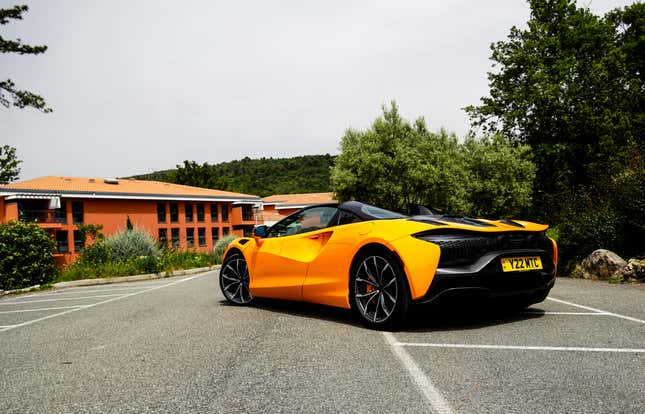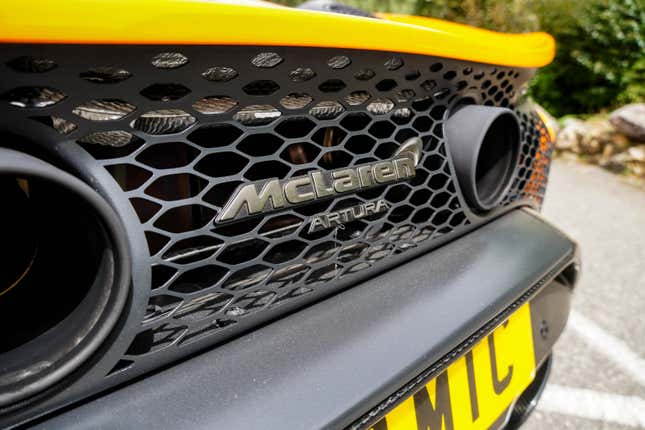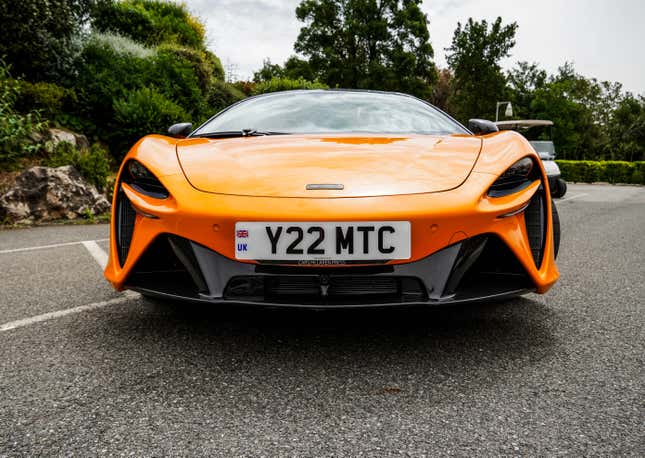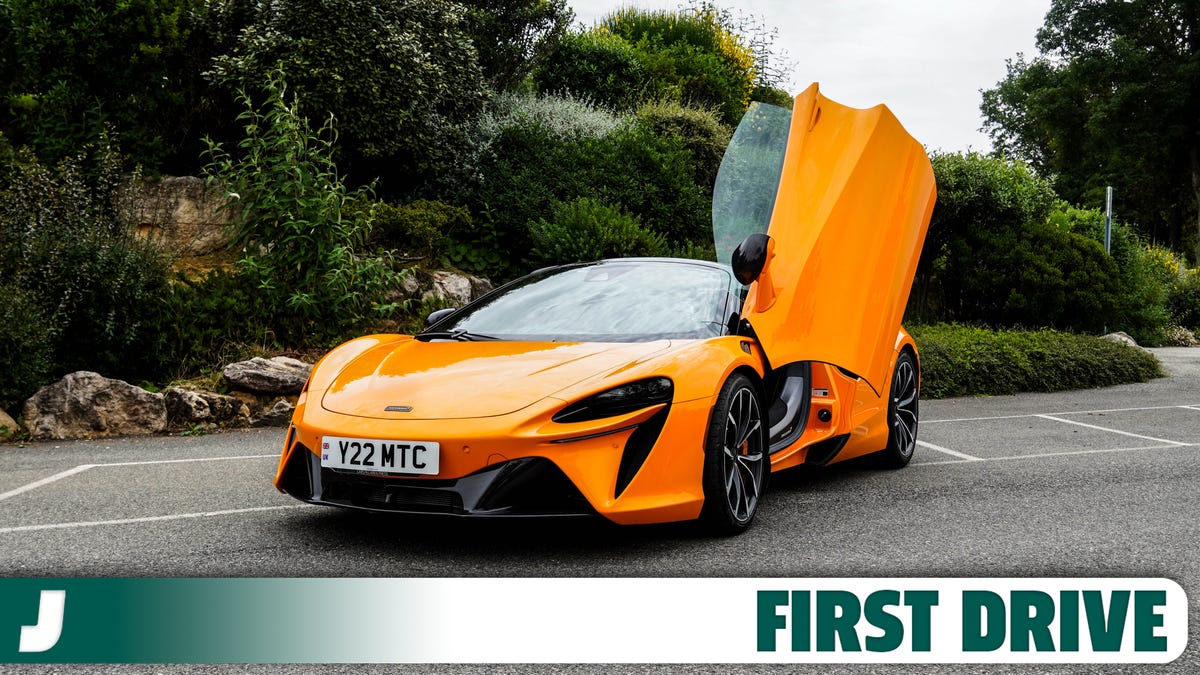How do you review your first supercar? As my trip to test drive the 2025 McLaren Artura Spider approached, I kept asking myself that same question. How could a poor kid from Michigan truly understand the nuance of a quarter-million-dollar machine? How could I do it justice, having never driven anything similar before? How do I convey the feeling of this car to an audience that will likely never drive anything similar? How the hell do I review a supercar?
Today, we’re going to find out together.
Full disclosure: McLaren invited me out to the south of France for the kind of luxury experience that only supercar owners could afford. I flew first class, stayed in the iconic Hotel de Paris in Monaco, and ate more food than should have been feasible, but I bravely endured these hardships to bring this review to you.
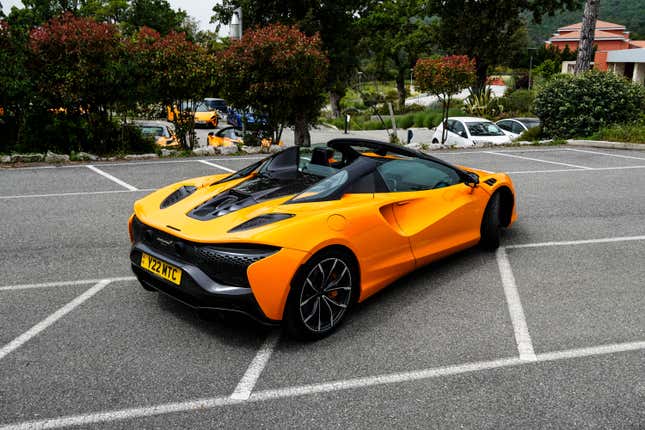
Let me start with the specs, the indisputable facts of the McLaren Artura Spider that we all have access to. The twin-turbo 3.0-liter V6 engine is paired with an electric motor to produce a delicious 690 horsepower and 531 lb-ft of torque. (That’s a boost from the Artura’s original 671 hp; the greater power is available on the coupe with a quick update.) The retractable roof and electric motors add a mere 136 pounds to the Spider’s overall 6,439-pound weight. The folding hardtop — composed of a single pane of carbon composite or an electrochromic glass panel that can adjust the amount of light allowed into the cockpit — can be lowered and raised in just 11 seconds.
The Spider also benefits from a slew of updates that its hardtop counterpart didn’t feature, like stiffer engine mounts, quicker Proactive Damping Control, a 25-percent-faster eight-speed gearbox, a nicer sounding exhaust, a Papaya Orange stop/start button, new brake cooling ducts, and a hilariously named “Spinning Wheel Pull-Away Mode” that essentially just means you can impress everyone with some sick burnouts. You can relish in Electric mode for quiet city-center driving or bump it up to Comfort for a long Sunday cruise. If you’re like me, you’ll spend a lot more time in Sport mode, and the optional Track mode option promises to keep things immensely spicy.
But no one is buying a supercar based exclusively on numbers alone. Specs are the entry point to any vehicle, but they can only tell you so much about what it’s actually like to drive the car. They’re never going to convey the sensation of speed as you press the accelerator, or the satisfyingly firm feedback of the steering wheel as you ease into a sweeping turn through a French plateau, the wind whipping through your hair and the scent of freshly bloomed lavender and mimosa wrapping you up in a fragrant, breezy bouquet.
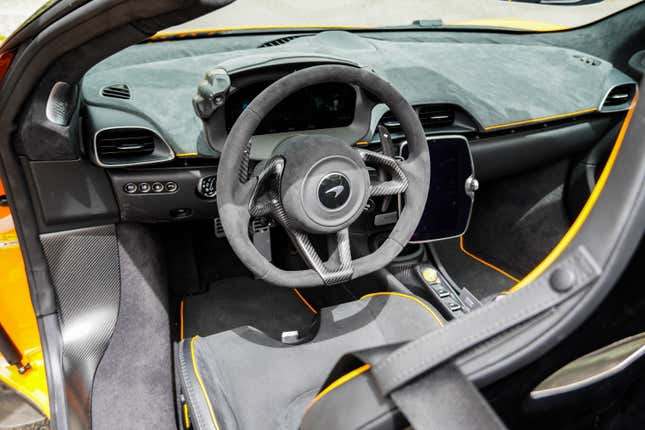
I don’t quite know how to describe it, other than that the Artura Spider feels like it was built for you — you, specifically — to drive it. The cockpit is pared back to the essentials, and from the very first moment you climb inside and look at its orange start button, you can tell it’s inviting you to play, teasing you. I was one of the first journalists on the trip to send the engine snickering to life, and I had to force myself to wait. Hold on. Don’t be the first person to fly out of the parking lot in a spray of gravel and noise. Let someone else lead the way on unfamiliar roads.
The first part of our drive was a perfect crash course in supercardom before we began to ascend the narrow switchback mountain roads. Before long, I was sandwiched between a rocky cliff face and a verdant wooded tumble into the abyss, and instead of terrified, I felt more confident behind the wheel of the Artura Spider than I’ve felt in anything in my entire life.
I kept thinking to myself, I get it. I get it now. I completely understand why European racing originated on sparsely populated hills or gently sweeping farm roads like the ones I was mastering. There’s something about the contrast of a roaring engine piercing through nature’s stillness that made me feel powerful and confident and yet still connected the countryside. With the roof down, I could feel the temperature drop several degrees as I entered a tunnel of green trees arcing over the road. I could hear the pitch of the exhaust fan out through the countryside as forest gave way to rolling farmland. I could taste the salt in the air well before I reached Monaco.
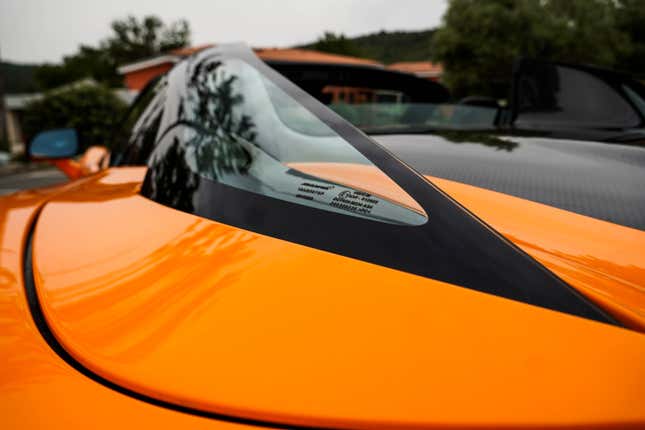
And there I was, conquering the ever-changing landscape in an obscenely capable manmade machine. I had nothing to do with the creation or evolution of the Artura Spider, but the simple act of controlling 690 delicious horsepower with such ease made me feel like I was far more than a mere human. I felt divine.
The entire concept of the supercar is packed with contradictions like that. Here is this stunning piece of technology designed to flip your stomach upside down the moment you press the accelerator, but features like lane departure warnings and speed limit detectors — things I’d expect on my more affordable Cadillacs or Lexuses — have only just now become standard. The incredible electrochromic roof panel adopts something called “suspended particle technology” that can block 99 percent of sunlight and 96 percent of solar energy to keep the cockpit as cool as possible and prevent any unwanted sunburns with literally the touch of a button.
At the same time, though, the machine’s 8-inch vertical screen can be quickly washed out in sunny conditions; that was a particular annoyance because, since Android Auto isn’t available on the Artura Spider, I had to use the car’s sometimes-awkward in-house navigation system that didn’t recognize road closures or offer nuanced audible directions in uniquely challenging road situations. The sculpted body panels are crafted through an aluminum hot-forming technique that can create the smooth, flowing curves of the Artura Spider without any pesky panel gaps getting in the way, and yet wireless charging is brand-new (albeit in the form of a padded, upright slot that holds the phone in place even if you’re whipping through a track at high speeds). Behind the wheel, though, you forget about all of that. Instead, you’re perfectly encapsulated in a cockpit designed to bring you thrill after thrill.
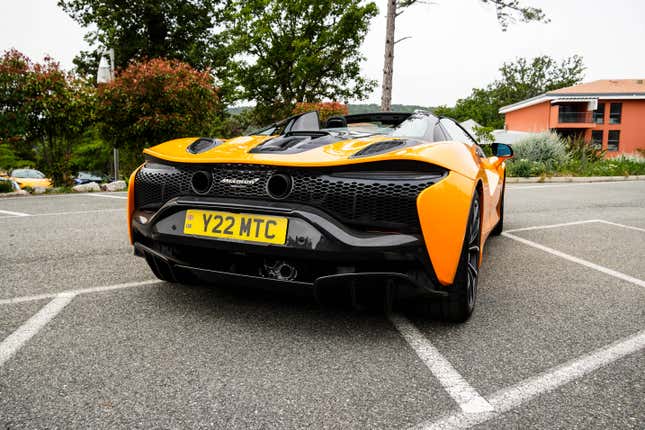
I started off my drive in Comfort mode, which still brings with it a beastly roar as the machine comes to life, though with a slightly less beastly exhaust note than you’ll hear at full bore and with a gentler kick as you press down the throttle. It was great for the slow-speed drives through quiet French towns punctuated by speed bumps, roundabouts, and traffic lights. When a road sign warned that a village was approaching, it was easy to flick into Comfort mode and press the button that controls the front-axle ride height to lift me up over any obstacles.
When we started approaching the truly twisty bits of our mountain cruise, I popped over to Sport mode courtesy of the handling and powertrain selectors that are available just at the top of the instrument cluster. Don’t worry too much if you’re short like me; when you adjust the steering wheel, the entire cluster comes with you, making it easy to toggle between options.
Here, you can really start to see the Artura Spider’s hybrid powertrain shine. With the instant torque offered by the electric motor, every touch of the pedal will launch you forward with a spirited leap before the combustion engine enacts a smooth and deliciously loud takeover. Steering is firm and precise, and the brakes are at their best when you’re using them to control the machine at higher speeds or more fiddly turns.
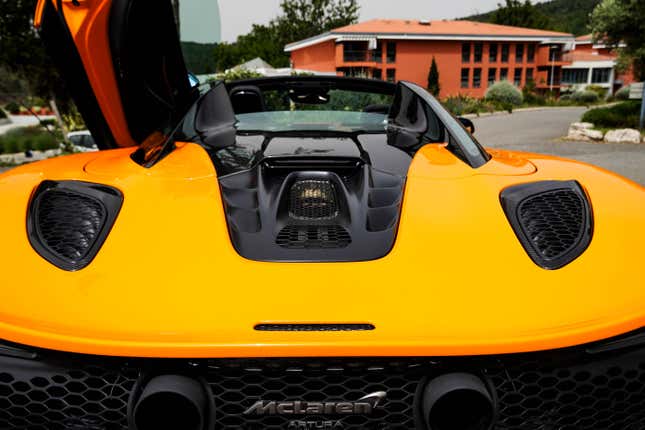
I popped into Track mode ever so briefly as I completed my final tight corners ahead of sweeping curves carved through a field-dotted plateau. Only at that point did I truly feel a little frightened of the Artura’s capability. You can feel every single horsepower at work, while your right foot itches to see just how far it can press the accelerator. You’re able to control the steering with the gentlest of inputs, which makes you feel perhaps a little more capable than you should. Speeds ramp up frighteningly quick in Track mode; it was only as the plateau curves knotted back up that I realized how fast I’d been moving. I dropped back down into Sport, content to leave Track mode for, well, the race track.
I decided to swap to electric mode for my final jaunt — a lap around the Monaco Grand Prix circuit (albeit at a slow, midday traffic crawl). In full EV mode, you can cruise like this for about 11 miles courtesy of the Artura’s 7.4-kWh battery; those are slightly unimpressive numbers that are matched by the fact that switching to electric also drops your beastly power output down to a measly 94 hp and 166 lb-ft. Of course, if you’re doing the whole “supercar” thing properly, you’ll likely only be using this drive mode to keep the peace with the neighbors.
As I crawled through the twists and turns of Monaco, one final bugbear became obvious: the McLaren Artura Spider’s brakes, while deliciously firm at speed, are a little more challenging to control at a rush hour crawl. Gently depressing the pedal didn’t offer much response, so you really had to jab it to bring it to a rapid stop. It makes for a twitchy drive as you come to grips with it, but by the time I climbed out of the car in front of the Hotel de Paris, I felt confident that I’d mostly mastered the sensation.
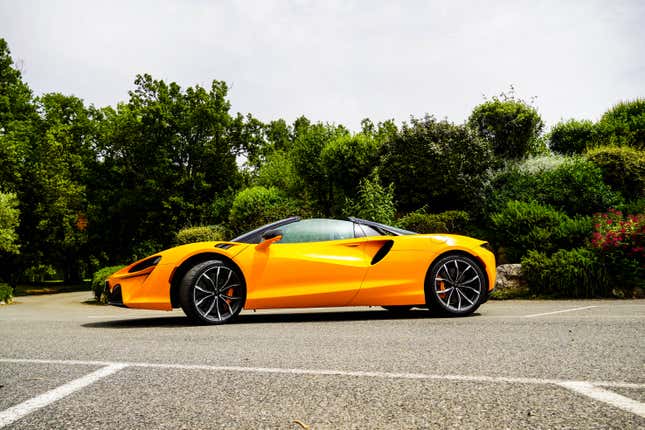
During dinner after our drive, I prodded some of my fellow journalists — those more familiar with the world of the supercar — to understand how they felt it compared to other machines. The general consensus was that the McLaren Artura Spider punches above its weight. It is, to some, a lighter, more comfortable, and more compelling machine than its closest rivals, the Maserati MC20 Cielo or the ultra-expensive Ferrari 296 GTS. Others told me it was a mature car that should be treated with more respect than it’s often given, especially when people refer to it as a “baby” McLaren. Still others played down their impressions, saying that the Artura Spider is “definitely a McLaren.” In my mind, that seemed like high praise.
At $278,800 — including a whopping $5,000 destination fee but excluding any of the optional extras like a Performance Interior package ($9,400) electrochromic roof ($9,400), or the driving assistance technology package ($8,350) — the 2025 McLaren Artura Spider may be an approachable supercar for some. For me, it was a look into a different universe, one where I can afford a night at the Hotel de Paris in Monaco and dine with former Formula 1 driver Stefan Johansson and crackle my exhaust pipes through a twisting mountain road in the French Riviera. I have to say, I quite liked the glamor the Artura Spider allowed me to inhabit for just a few short hours… but if this is an affordable high-performance vehicle, I simply cannot imagine the lifestyle that a rarer, more expensive machine might provide.
